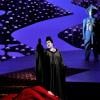
Several seasons after its premiere in Tokyo, San Francisco Opera’s new co-production of Puccini’s Madama Butterfly has finally reached the stage of the War Memorial Opera House. As interesting as director Amon Miyamoto’s conception and late fashion designer Kenzō Takada’s costumes were on opening night, June 3, Butterfly remains a singer’s opera. In my book, anything short of a staging that either grossly interferes with or greatly elevates the score comes second to the music itself. And in this case, the music remained primary.
Miyamoto’s show looks at the events retrospectively. It begins with a mute scene in which a letter from the elderly and seemingly near-death Pinkerton to his grown-up son Trouble recounts the marriage and death of Trouble’s barely remembered mother, Cio-Cio-San. This transitions to the opera’s first scene once the veils of memory, symbolized by a series of fast-parting translucent curtains, are lifted. But that concept is more interesting to think about than to see onstage.
SF Opera Music Director Eun Sun Kim certainly has the sweep of Madama Butterfly in her blood. Melodies flowed like water Saturday, the lush beauty of Puccini’s score glowing in the light that sweeps the stage once Pinkerton (Michael Fabiano), the American consul Sharpless (Lucas Meachem), and the ever-meddlesome matchmaker Goro (Julius Ahn) start to sing.

Alas, the melodies only began to encompass the tragedy of Cio-Cio-San (Karah Son). This performance of the opera came across as a lamentable story of two naive young people, secure in their delusions, who ignore repeated warnings and proverbial red flags. I may have felt sad for Butterfly and the pain she had to endure, but I left the opera house devoid of the wrenching catharsis that a great Madama Butterfly inspires.
Fabiano sang like a god. I did not expect, after multiple Turandots and years singing heavier lirico-spinto roles, that he would return to San Francisco with the same golden tone first heard here in Donizetti. But his vocal production seemed effortless. Fresh-sounding, filled with youthful ardor, and supremely passionate without ever seeming cocky, Fabiano possessed the beauty and freedom on high that the role requires. His final unison high C with Son at the end of Act 1 was strong and glorious.
First seen standing in the center of a long horizontal line of women at the rear of the stage, Son sounded overparted in her entrance aria. She was pushing her voice beyond its natural limits, and her vibrato’s undertones were far too dominant.

Once past the aria’s final C-sharp, however, Son quickly found the center of her essentially lyrical instrument and remained there for the duration of the opera. In at least 95 percent of the role, her voice was as lovely as her appearance and conveyed the essential sweetness and light of a 15-year-old bride. It was only in her big dramatic outpourings — “ Un bel dì, vedremo” and the final “Tu, tu, piccolo iddio!” — that she seemed unable to wrap herself fully around the heartbreaking tragedy of Puccini’s music.
When push came to shove, Son could not quite summon forth the steel of a true Italian spinto soprano. Nor did she succeed in tearing our hearts apart with the tragedy of Butterfly’s situation. “Un bel dì,” which should have left the audience in tears, was sung far too prosaically, with strict time replacing the freedom essential to its success. In romance, tempo must be dictated by the heart, not the metronome.
Meachem was as strong and satisfying as ever. Foregoing the handsome warmth of his lyric baritone, he sang in a voice that reflected authority, concern, and alarm. And in the final act, when his heart opened to Butterfly’s plight as a young mother forced to give up her son to a stranger, the warmth that makes him such an endearing favorite of San Francisco audiences came to the fore.
Straight of back, strong of voice, and equipped with a short stick that he wielded with the determination of a sheep herder or opera conductor, Ahn made for a single-minded Goro, less unctuous than unbearable. Ahn and director Miyamoto weren’t interested in getting laughs by stereotyping the character. Instead, Goro’s increasingly unwelcome presence underscored the unsustainability of Butterfly’s situation as a woman abandoned, betrayed, and wounded to the core by her clueless, colonialist husband.
As Suzuki, Butterfly’s devoted maid, Hyona Kim melded an extremely powerful and secure mezzo-soprano with actions and facial expressions filled with concern and compassion. Alas, what registered so clearly on her face was not reflected in the voice.

In smaller roles, Adler Fellow Jongwon Han as a strong and fine-voiced Bonze, Kidon Choi as the rejected Prince Yamadori, Kevin Gino as Uncle Yakuside, and the silent but extremely stage-ready Viva Young Maguire as Trouble stood out.
Which leads us back to the production’s overriding conceit — the flashback, a dying father’s retelling of what happened before and after his only son was born. The continual onstage presence of the adult Trouble (John Charles Quimpo) during the opera was most moving when he registered shock at new revelations. At times, this deepened the compassion for Butterfly and her heartbreak. But the adult Trouble’s frequent reactions could also be distracting from the main event. It was also unclear why, at the opera’s end, Trouble forgave his ailing father (Evan Miles O’Hare) but seemingly continued to give his innocent adoptive mother, Kate Pinkerton (Adler Fellow Mikayla Sager), short shrift. Nor did the tasteful and discreet handling of Butterfly’s suicide, as done here, serve the drama.
A mixed bag, then, lacking in essential tear-inducing elements. But it’s an essential production nonetheless for Fabiano’s Pinkerton, the beauty of the music (especially in Act 1’s extended love scene), and the novelty of the conception. Performances run through July 1.



